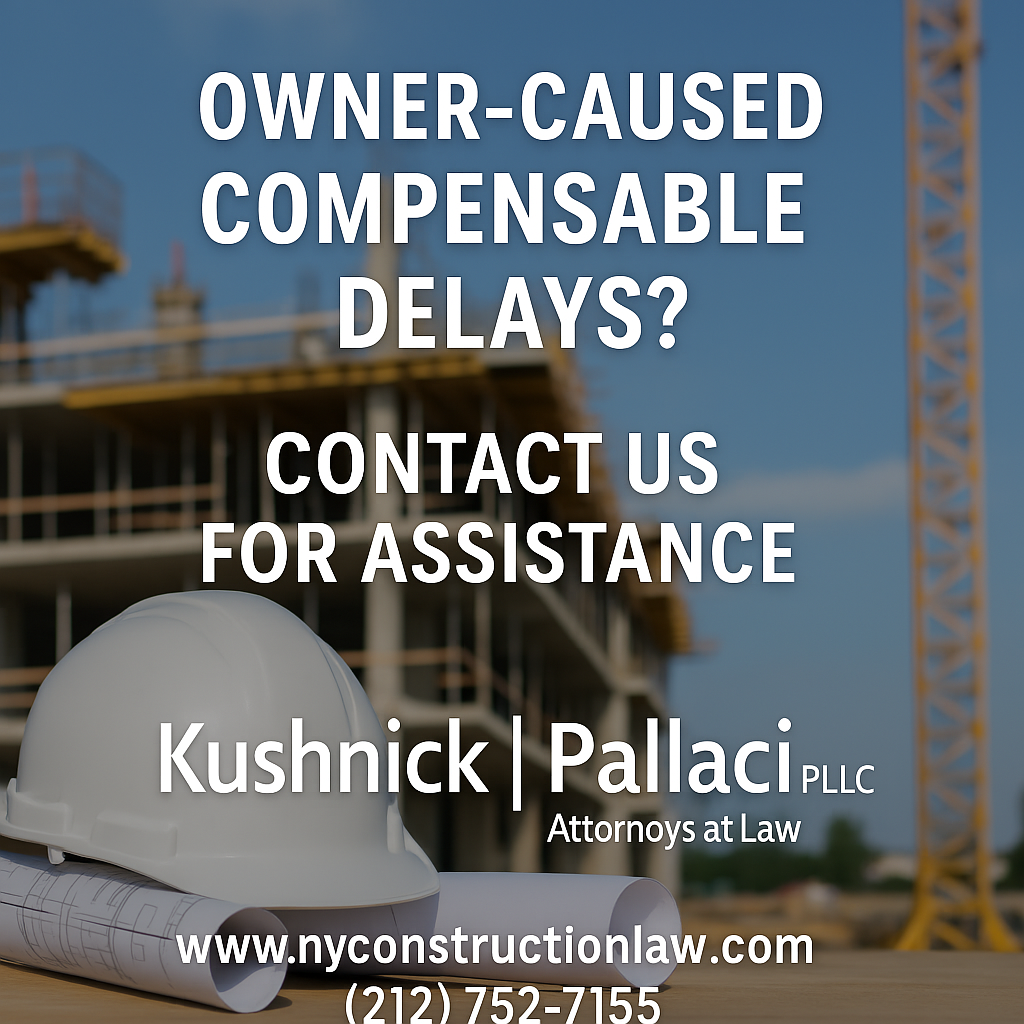Absent a No Damage for Delay Clause in a construction contract, compensable delays will entitle a contractor to a time extension and sometimes even additional compensation. Compensable delays are usually caused by some act or omission by the owner. However, the delay must be more than an ordinary delay in order to be compensable, and must be extraordinary and not reasonably contemplated by the parties. Forest Electric Corp. v. State, 30 A.D.2d 905, 292 N.Y.S.2d 589 (3d Dep’t 1968). Delays that are typical to a construction project will ordinarily not be compensable. Charles H. Sells, Inc. v. New York State Thruway Authority, 27 A.D.2d 893, 278 N.Y.S.2d 162 (3d Dep’t 1967). There are many different factors that can cause compensable delays, and the most common delays are owner interference, delayed notice to proceed, delays in inspection and approval, defective designs, contract changes and extra, and changed conditions.
Construction contracts carry an implied obligation that neither party will interfere with the other, and that the owner will not interfere with the continuation of the contractor’s work. Shalman v. Board of Ed. of Central School Dist. No. 1 of Town of Thompson et al., 31 A.D.2d 338, 297 N.Y.S.2d 1000 (3d Dep’t 1969). In most cases, owner interference will allow a contractor to demand compensation in addition to extra time needed to complete the project in the absence of a No Damage for Delay Clause. However, an owner’s liability to its general contractor for owner-caused delay does not mean that the general contractor is responsible to any subcontractors for an owner-caused delay. In Phoenix Elec. Contracting, Inc. v. Lehr Const. Corp., 219 A.D.2d 467, 631 N.Y.S.2d 146 (1st Dep’t 1995), quoting Triangle Sheet Metal Works, Inc. v. James H. Merritt and Co., 79 N.Y.2d 801, 802 (1991), the court stated that “absent a contractual commitment to the contrary, a prime contractor is not responsible for delays that its subcontractor may incur unless those delays are caused by some agency or circumstance under the prime contractor’s direction or control.”
Owner liability for contractual delay damages has been found where an owner issued stop work orders (Camarco Contractors, Inc. v. State, 33 A.D.2d 717, 305 N.Y.S.2d 207 (3d Dep’t 1969)); where an owner failed to keep mental patients from interfering with the contractor’s work (Farrell Heating, Plumbing, Air Conditioning Contractors, Inc. v. Facilities Development and Imp. Corp., 68 A.D.2d 958, 414 N.Y.S.2d 767 (3d Dep’t 1979)); where an owner refused to allow a contractor to use an acceptable procedure consistently allowed in the past (Johnson, Drake Piper, Inc. v. State, 31 A.D.2d 980, 297 N.Y.S.2d 754 (3d Dep’t 1969)); where the owner did not clear the project site of obstructions that interfered with the commencement and continuation of work (Columbia Asphalt Corp. v. State, 70 A.D.2d 133, 420 N.Y.S.2d 36 (3d Dep’t 1979)); where the owner failed to keep temporary heat at the building construction site, as mandated in the construction agreement (De Riso Bros. v. State, 161 Misc. 934, 293 N.Y.S 436 (Ct. Cl. 1937)); and where an owner opened a road on which the contractor was working to traffic, for the use of other contractors, and to a college. Johnson v. State, 5 A.D.2d 919, 172 N.Y.S.2d 41 (3d Dep’t 1958). Notably, owner interference that is an active interference may entitle a contractor to compensation even if the contract contains a No Damage for Delay Clause.
Owner interference may also be found in instances where delay is caused by the acts of entities under the owner’s control, for example, when an owner fails to coordinate the work of the owner’s other prime contractors causing their work to hinder the work of the claimant contractor. Forest Elec. Corp., 30 A.D.2d 905; See also John B. Pike & Son, Inc. v. State, 212 A.D.2d 963 (4th Dep’t 1995). In Websco Const. Corp. v. State, 57 Misc.2d 9, 292 N.Y.S.2d 315 (Ct. Cl. 1966) it was held that an owner has an obligation to regulate and coordinate the activities of its several prime contractors. Owners are found to have an obligation to make serious and substantial efforts to coordinate the work and pressure any of its delaying contractors to prompt performance. Therefore, an owner may be liable for delay damages when it allows a contractor to perform its work over another contractor’s objections, thereby disrupting the construction schedule, and preventing the claimant contractor from performing work through economical methods. R.H. Baker Co. v. State, 267 A.D. 712, 48 N.Y.S.2d 272 (3d Dep’t 1944).
If the contract relieves the owner of a duty to regulate and coordinate activities to ensure minimal delays or provides that the own will not be liable for delay or damage caused by other contractors, it will not be liable for delay damages despite a failure to coordinate. Gottlieb Contracting, Inc. v. City of New York, 86 A.D.2d 588, 446 N.Y.S.2d 311 (1st Dep’t 1982). However, an owner may not escape responsibility for delay by delegating its supervisory duties to its architect or to one of its independent prime contractors. Norman Co. v. Nassau County, 27 A.D.2d 936, 278 N.Y.S.2d 719 (2d Dep’t 1967).
If an owner is denied access to the work site, it should be entitled to compensation in addition to a time extension. An unobstructed work site made available to a contractor by the owner so the contractor can do the work required is one of the fundamental contractual obligations placed on the owner. Fehlhaber Corp. v. State, 65 A.D.2d 119, 410 N.Y.S.2d 920 (3d Dep’t 1978). Therefore, delay in furnishing an unobstructed work site may be compensable as held in Fehlhaber.

